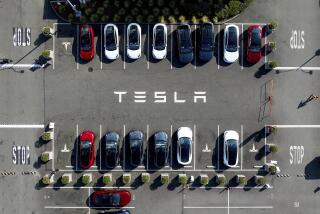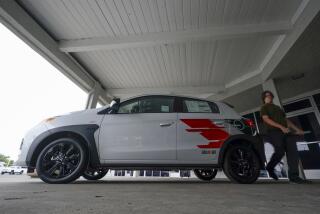Soft Prices for Used Cars Don’t Mean Deals for Everyone
Consumers who raced to take advantage of the auto industry’s discount financing and cash incentives for new cars in the last quarter of 2001 flooded the market with late-model used cars, helping create a glut that has sent used-car prices into a dramatic downward slide.
But before you pick up a speeding ticket hurrying down to auto row, consider: The situation doesn’t mean fantastic deals for everyone--indeed, only car dealers and customers with no trade-in are likely to see much of an upside in the situation, auto pricing specialists say.
The reason? As both new and used vehicle prices soften, so does the value of cars that shoppers hope to use for trade-ins.
“You can still cherry-pick to find bargains, but the system is self-adjusting and there are no free lunches,” said Jeremy Anwyl, president of Internet auto shopping service Edmunds.com.
Paul Taylor, chief economist for the National Automobile Dealers Assn., said the used-car glut already is showing signs of drying up--in part because the new-car sales that generate trade-ins for the used-car lots are expected to fall by a million or so units this year.
In the meantime, for used-car shoppers, it’s “a really good time if you don’t need [the proceeds from] a trade-in, and even if you do, you can probably realize a small savings” over what the same vehicle would have cost you six months ago, said Jim Hossack, an industry analyst with AutoPacific Inc. in Tustin.
Edmunds.com, which tracks some 50,000 new- and used-car transactions a week, searched its databanks for Highway 1 and found that with the exception of low-volume luxury cars, classic vehicles and routinely high-value used cars such as the Honda Accord, prices for late-model used cars have dropped 10% to 15% since August.
A parent buying a used car for a child heading off to college--often the kind of deal that doesn’t involve a trade-in--could save thousands of dollars now by going after that late-model Toyota, BMW or Jeep.
A 2000 Toyota Camry LE sedan that would have sold for $13,638 in August, for instance, was worth an average of $11,888 at the beginning of this month, according to Jeff Huang, Edmunds.com’s used-car pricing manager. The savings now over then would be $1,750.
But if buying the 2000 Camry is dependent on selling a 1996 Camry--a likely trade-in vehicle for a family of Toyota loyalists looking for a newer model--the equation changes.
The 1996 Camry lost 18% of its value in the same period, dropping to $6,693 from August’s price of $8,136.
So back in August, the difference between the two Toyotas, or the effective price of the 2000 model, was $5,475.
In early January, the difference was almost the same: $5,195--representing a savings of just $280.
*
(BEGIN TEXT OF INFOBOX)
Depreciating Value, Los Angeles Times
(text of infobox not included)






